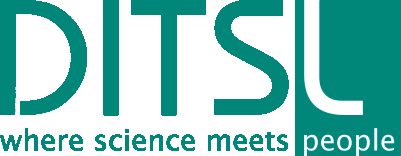MSc thesis by Maria Höhne 
Fieldwork conducted: January – April 2014
This study conducts a participatory ex-ante situation analysis, which aims to identify potential points of entry for innovations by investigating context specific demands, constraints and opportunities for the uptake of innovations from the farmer’s point of view. Issues of difference and underlying relations and logics of the context are revealed by recognizing different livelihood strategies and regional and socio-economic variations in resource endowment.
Field data collection was carried out from January until April 2014 in four case study sites in the Morogoro (semi-humid) and Dodoma (semi-arid) regions of Tanzania. Participatory methods combine livelihood analysis with a collective assessment of agricultural activities. Per village, approximately 100 people participated in 14 group sessions using livelihood illustration and charting, net maps and problem trees, as tools in groups segregated by gender. Resource maps and seasonal calendars were developed with mixed groups.
Results show that livelihood in all CSS is centered on agricultural activities on small holder farms, which is the major source of both food and income. Other income opportunities are limited and restricted to some wealthier families. This lack of diversification leads to increased vulnerability. Especially affected by environmental volatilities are low to medium income farmers, as they lack the means to influence production conditions.
The study concludes that innovations need to target connected problems along the crop-value chain for low to medium income farmers. Potential entry points should focus on: addressing resource limitations, addressing current reasons for losses and optimization of marketing. Given resource limitations, potential innovations can neither be capital nor labour demanding and should generate straight-forward benefits to the farmer. Innovations should focus on solving resource limitations by finding connected solutions that build on each other and tackle problems along the value chain in support of the whole farming system. An actor oriented approach for the development of innovation strategies is recommended.
MSc thesis by Raúl Fernández
Fieldwork conducted: February – May 2015
Title: Factors affecting the functioning of farmer groups: perspectives from three farmer groups in Tanzania
This research aims to reveal farmers’ own perceptions of factors that affect the functioning of farmer groups in their specific locality. Furthermore, the researcher aimed to identify disincentives to joining groups and circumstances surrounding farmers’ group development in their locale.
The study took place in the Trans-SEC case study site villages. Ten days were spent with each collaborating group and activities included creation of a ‘group history’ and a self-assessment. A participatory timeline method covered key questions relating to how the group started, what motivated different members to join the group, and perceptions about what makes the particular group more or less functional. Group members outlined their own criteria for assessing group functionality. Additionally, semi-structured interviews and focus discussion groups with group members, non-members and key informants were conducted. Social capital factors such as trust, unity or altruism received a particular focus throughout the research and furthermore, the research aims to establish how social factors interplay with financial, human, natural or physical related types of capital.
Participatory Video and other Participatory Rural Appraisal methods fostered a critical engagement with participants and facilitated group planning of future actions to be carried in the frame of the Trans-SEC project.
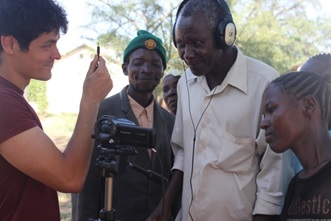
MSc thesis by Kerstin Schulz
Fieldwork conducted: January – April 2015
Title: Participatory Scenario Building to assess possible implications of gender and socio-cultural factors for innovation uptake decisions in Tanzanian small-farming communities
This research involves facilitation of a Participatory Scenario Building process, including role-play activities, to collaboratively assess the potential risks and outcomes of various innovations, with a focus on highlighting gendered and socially-differentiated perspectives. The thesis (1) builds on existing secondary data to characterise gendered and socio-cultural patterns of difference in the four Trans-SEC case study sites, (2) highlights how key socio-cultural factors influence farmers’ perspectives on innovations and uptake decisions, in relation to their differential capitals and capabilities, and (3) assesses role play as a tool for expressing social issues around innovation uptake.
Ten days were spent with each collaborating group and the Participatory Scenario Building process involved mapping of capitals (resources), problem and solution trees, envisioning activities and the creation of ‘innovation road journeys’ (identifying actions, risks, boundary partners and outcomes). Role play sessions were conducted in relation to perceived risks and outcomes of different innovations. Social factors were identified and characterized by the farmer groups, and activities carried out in strategic sub-groups to highlight the social differences in perspective. To put into context farmers’ decisions around innovation uptake, discussions on how social factors affect the everyday life of participants took place. Additionally, informal interviews with group members and key informants were conducted. As a culmination of the workshop activities, group-specific innovations were proposed by group members and the most promising were self-selected for implementation.
Participatory Scenario Building and Role Play fostered a critical engagement with participants and facilitated group planning of future actions to be carried in the frame of the Trans-SEC project.
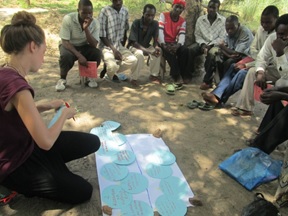
MSc thesis by Pramila Thapa
Fieldwork conducted: August – November 2015
Title: Processes, outcomes and social sensitivity of Participatory Monitoring and Evaluation systems: collaboration with four farmer innovation groups in Tanzania
| This Participatory Action Research study aims to reveal farmers’ own perceptions of social factors that affect the effective functioning and social inclusiveness of Participatory Monitoring and Evaluation (PM&E) activities as part of group innovation processes. | 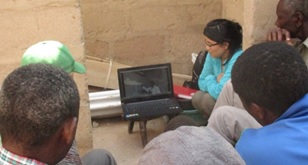 |
|
| Between August and November 2015, at least two weeks were spent in each of the four Trans-SEC case study sites, working with a collaborating farmer group in each village. Activities included facilitation of the development of an innovation and group-specific ‘PM&E system’ and a group-assessment of this system following implementation. Semi-structured interviews and focus discussion groups with PM&E team members were conducted. | ||
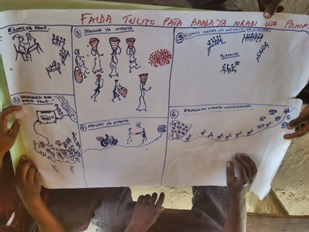 |
Initial key questions related to the (expected) achievements/outcomes of the innovation and PM&E process. Group members recalled their project action plans and reflected on changes made to it, if any. Social factors such as age, gender and education received a particular focus throughout the research, which aims to assess how PM&E processes could be made more sensitive and inclusive of social differences within farmer groups. As a result of this process, each group implemented a self-defined PM&E system. |
|
Later PM&E activities included SWOT analysis, Cost-Benefit Analysis, group discussions and feedback sessions. Additionally, Most Significant Change (MSC) workshops encouraged sharing of lessons learned through the innovation and PM&E processes. Publication: Participatory Monitoring and Evaluation: a tool for making farmer groups function better (in Appropriate Technology 44:4 43-45) |
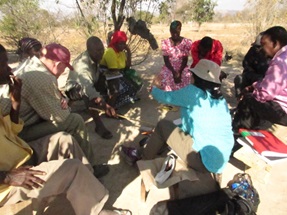 |
|
MSc thesis by Esther Mieves
Fieldwork: February – March 2016
Title: The relation of socio-cultural factors to innovation outcomes in four Tanzanian villages
This MSc research focuses on identifying and analysing how socio-cultural factors (eg. gender, age, status, education) are implicated in farmers' experience of the Trans-SEC innovation processes. The research aims to reveal how and to what extent socio-cultural factors influence the outcomes of different innovations, for different farmers.
Up to 10 innovation (farmer) groups, implementing different upgrading strategies across the Trans-SEC case study sites will be engaged in this study. Semi-structured interviews and focus group sessions are planned, supporting Most Significant Change workshops with selected participants. These workshops will generate 'stories of change' or personal testimonies about experiences of the different innovation processes and outcomes. Afterwards, feedback sessions will be conducted with members of each of the different innovation groups, to validate and elaborate on preliminary results, and to provide a platform for sharing knowledge. This process will lead to a collaborative assessment of how the innovation processes are influenced by multiple socio-cultural factors and how different social groups experience their innovations differently. The collected (qualitative) data will be coded and analysed, and compared with data collected by Trans-SEC through group and household monitoring surveys.
Critically, the results of this study will guide strategies for enhancing social inclusion and pro-poor innovation processes.
